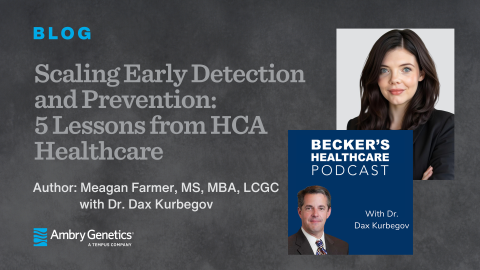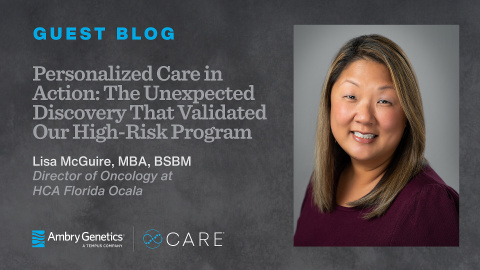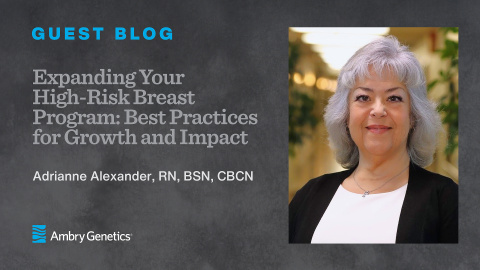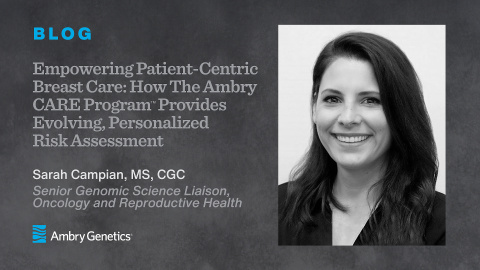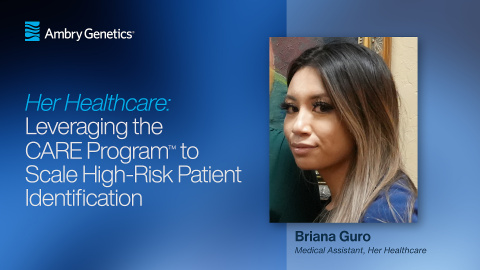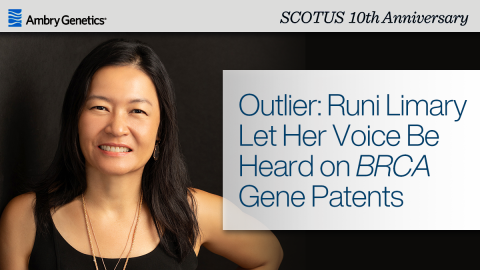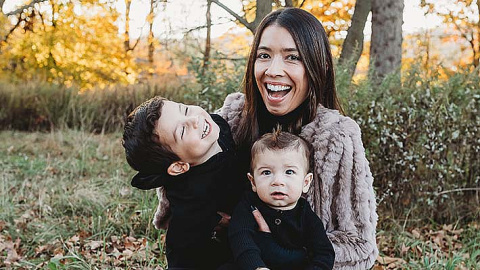- By Meagan Farmer
- Posted August 7, 2025
Scaling Early Detection and Prevention: 5 Lessons from HCA Healthcare
Only a fraction of high-risk individuals ever learns about their inherited cancer risk. But it doesn’t have to be that way. In a recent Becker’s Healthcare podcast, Dr. Dax Kurbegov, Senior Vice President at HCA Healthcare’s Sarah Cannon Cancer Network, shared how his team is closing that gap by building a scalable model for risk assessment…
- By Lisa McGuire, MBA, BSBM
- Posted June 4, 2025
Personalized Care in Action: The Unexpected Discovery That Validated Our High-Risk Program
As the Director of Oncology at HCA Florida Ocala, I've witnessed firsthand how the combination of innovative technology and dedicated healthcare teams can transform patient outcomes. When we launched our high-risk women's program in 2023, I served as project manager, coordinating the implementation of the Ambry CARE Program® (CARE) across our…
- By Adrianne Alexander, RN, BSN, CBC
- Posted July 17, 2024
Expanding Your High-Risk Breast Program: Best Practices for Growth and Impact
One of the accomplishments I am most proud of is driving the creation of a successful high-risk breast program in a large community-based health system. I am often asked how we did it. For advice on getting started, check out the first blog in this series. If you have already implemented a high-risk breast program, congratulations! It’s time…
- By Sarah Campian, MS, CGC
- Posted March 20, 2024
Empowering Patient-Centric Breast Care: How The Ambry CARE Program™ Provides Evolving, Personalized Risk Assessment
How would you respond if a patient asked, "What is my risk of getting breast cancer"? We may initially reference the national average: 1 in 8 (or about 13% of) people assigned female at birth (AFAB) develop breast cancer.1 However, we live in an age of personalized medicine; this statistic cannot be applied universally to every patient. Further,…
- By Meagan Farmer
- Posted August 9, 2023
Her Healthcare: Leveraging the CARE Program to Scale High-Risk Patient Identification
We recently met with Texas OB/GYN, Dr. Noel Boyd. We learned about her passion for caring for the whole patient and helping to identify those at increased risk for cancer so that they can make proactive choices to address their risk. Dr. Boyd’s practice implemented The CARE ProgramTM, which stands for “Comprehensive Assessment of Risk and…
- By Jodi Tahsler
- Posted June 13, 2023
Outlier: Runi Limary Let Her Voice Be Heard on BRCA Gene Patents
When it comes to breast cancer, Runi Limary has more personal experience than average. She not only spent time working at a nonprofit for people with breast cancer, but she was diagnosed herself at the young age of twenty-eight. When ACLU lawyers reached out to her about the court case regarding BRCA1 and BRCA2 patents to see…
- By Noelle Carbognin
- Posted February 17, 2022
Thanks to Genetic Testing, I Now Know My Cancer Risk
“It’s one thing to be scared to hear something, it’s another to die from not hearing something at all.”—Rick, Colon & Kidney Cancer Survivor (American Cancer Society) When I was twelve years old, my cousin was diagnosed with Stage 4 colon cancer. She was only 24. My mother knew my grandfather on…
